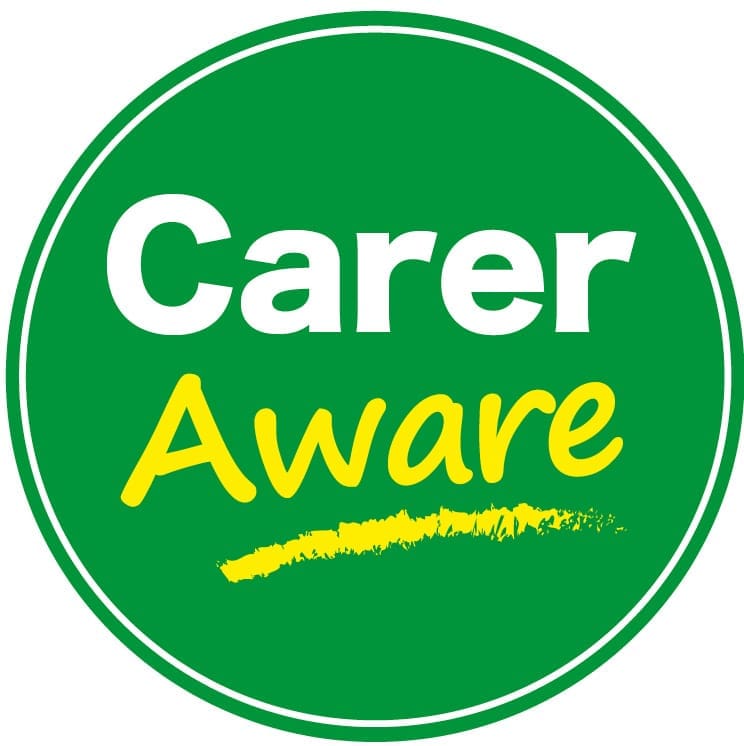Information for carers
How we support carers
As the carer of someone receiving our services, you should be given the opportunity to talk to us about:
- the person you care for – please feel confident to tell us information you think it is important we should know
- your own needs in your caring role – carer support within GHC should routinely be offered to you.
What is on offer will depend on which service your friend or family member is using, but common examples of this support are:
- information on health conditions and disabilities and what to expect in future
- inclusion in discussions and meetings about treatment options, condition management and discharge planning
- advice about how you can best support the friend or relative who is using our service.
Our teams support people experiencing different types of health problems and who have varying levels of need. The different services we offer also work in different ways.
Contact us
Ambassador for Carer Practice and Carers Lead: Cathy.Newman@ghc.nhs.uk
Experts by Experience
Experts by Experience are people who have personal knowledge of our services, either through their own use of those services, or through caring for someone else.
They help us better understand and meet the needs of our service users and their carer’s, and assist us to involve and learn from people who know most about our services through receiving them.
Activities that Experts by Experience can be involved in include:
- Staff recruitment
- Project work, co-producing the planning, design, delivery, development and review of services
- Evaluating services and quality assurance
- 15 Step Challenges
- Staff training
- Peer training at the Recovery College
- Engaging with the public at events, on a stand or co-delivering a workshop
- Attending meetings to give feedback
- Research
Experts by Experience are able to claim travel expenses and an honorarium (payment) for their time.
If you know a person with lived experience or a carer who would like to join our Trust as an Expert by Experience, please contact the Partnership and Inclusion team on 01452 894200 or partnershipandinclusion@ghc.nhs.uk and someone will arrange to meet and discuss ways to get involved.
Carer Champions
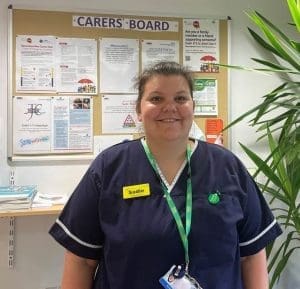
A Carer Champion is a member of the team who takes a lead role and helps the wider team coordinate the identification and support of patient carers.
They act as a voice for carers within the team and are a key point of contact for carer information. They are required to represent that work area at meetings with other like-minded colleagues who are also Carer Champions in similar locations, to share ideas, concerns, best practice and to look to positively influence and shape future provision and work with Triangle of Care in mind, and as the primary focus.
Carer Aware lanyards and badges are now available to support the identification of Carer Champions within teams, or can be worn by anyone who is passionate about supporting carers, or working with them.
Sadie Miles, Carer Champion for Willow Ward at Charlton Lane Hospital, is pictured above wearing her new Carer Aware lanyard and badge with pride, while presenting Willow Ward’s new Carers’ Noticeboard.
Please contact Carers Lead Cathy Newman to request badges or lanyards at cathy.newman@ghc.nhs.uk
Your feedback
As a carer of someone using our services, your feedback is really important to us. Please take a moment to complete our survey and give us your thoughts.
You can complete the survey here.
The survey is completely anonymous so we will not be able to respond individually. If you would like your feedback or concerns followed up, please also contact the Patient and Carer Experience Team.

Feedback: April 2023
Carer experience feedback taken from Friends and Family tests during April 2023:
- 85% felt the service they received as carers was good or very good
- During April, carers told us we communicated well with them – treating them with respect and dignity, keeping them informed and answering any questions they had
- During April, carers told us it would be even better if we referred more of them to the Carers Hub for support.
You can find out more about Gloucestershire Carers Hub here>
If you have safeguarding concerns
For safeguarding concerns in Gloucestershire, please contact the Gloucestershire Safeguarding Children Partnership or the Gloucestershire Safeguarding Adults Board.
Carer's Assessment
As a carer, you have a legal right to an assessment of your needs under the Care Act 2014.
A Carer’s Assessment is not a test of your ability to care. It recognises your crucial role, and that supporting your emotional, physical and mental wellbeing is essential.
Depending on your needs and eligibility, an assessment may result in:
- A payment for you to spend on something that makes caring easier
- Some practical help for you, for example respite care
- Information and guidance about other ways your needs might be met.
If you think this would be helpful or want to know more, staff can help you by putting you in touch with Gloucestershire Carers Hub, who will talk to you about:
- your needs and what you think will support you
- what services locally are available to help you
- how to access the services you are eligible for.
Gloucestershire Carers Hub staff can help you decide whether you would like a formal carers assessment. You do not need to have a Carers’ Assessment to be able to access much of the carer support available locally, free of charge.
This might include:
- information and guidance about support in the community
- emotional and wellbeing support for you
- courses and education about caring and looking after yourself
- contact with other carers in similar situations who know what you are going through and can share their experiences
- information about benefits and help to manage debt can also be very useful.
You don’t need to live with the person you are supporting, or be caring full time, to speak to Gloucestershire Carers Hub – you may be trying to juggle work and caring, and this is what is having a big impact on you.
You can also contact Gloucestershire Carers Hub yourself at any time. They do not require a referral from a professional to support you. Visit the Gloucestershire Carers Hub website at: www.gloucestershirecarershub.co.uk
If you have not been offered a Carer’s Assessment and you would like one, please speak to the named nurse or care coordinator of the person you care for to find out who does this with you.
Most people find talking through the assessment with a member of staff from Gloucestershire Health and Care NHS Foundation Trust or Gloucestershire Carers Hub works best to identify what will help them. The assessment is a guided conversation about you and your needs, so you should take some time to think about what is most important for you.
Carers Information Booklet
Our carers information booklet aims to provide some information about your involvement in the care we provide to your friend or relative but equally importantly, it aims to provide information about support for you in your caring role, from us and from other local organisations.
To request a copy of our Information for Carers booklet, email ghccomms@ghc.nhs.uk.
Advance planning
Planning is key to coping with a crisis, so it’s important to think in advance about an action plan. You and the person you care for might like to make a plan about what they want to happen if there is an emergency.
Often, as part of their care, teams will help your friend or relative to plan what will happen if they become unwell again. If carers are part of that plan, they should be involved and have a copy of it so they know what’s expected and who to contact.
Your friend or relative can also make a plan for themselves about what they want to happen in future, if they want and are able to. They may like to involve you in this.
The plan can be in any format. There are some Advance Care Planning tools available from staff, but it does not need to be on a special form. The important thing is that staff know about it. Service users, friends and family can talk through and record preferences about treatment, and other future support that might be necessary, and these can be stored in the clinical records so staff are aware of them if a situation arises.
Carers often recognise early signs that someone’s health is deteriorating. You should not worry that you will be seen as ‘making a fuss’ – you are the person who may be most aware of a developing problem and staff should respect your opinion.
If you are requesting help, the following list can help you prepare what to say:
- Situation: Who is calling and why? Be clear about the situation
- Background: How has this come about and what has happened?
- Assessment: What are the problems that you are worried about?
- Recommendations: What do you feel would help?
- Decision: Make a note of what was agreed and who will do what.
Confidentiality and information sharing
Staff have a legal duty to keep personal information confidential. For a variety of reasons, service users sometimes do not consent for staff to share information with carers, and if they are able to make that decision staff need to respect it.
However, it is good practice for staff to revisit this decision with service users, to ask them if it applies to all information or just some things, and to remind the service user of the positives of carer involvement.
If the person you care for has agreed that information can be shared with you, planned care or treatment should be discussed with you. If not, you can still receive general factual information both verbally and written, as well as support for yourself in your caring role.
As the carer you should be helped to understand:
- the present situation
- any confidentiality restrictions put in place by the service user
- the service user’s treatment plan and its aims
- any written care plan, crisis plan or recovery programme
- the role of the professionals involved in the service user’s care
- how to access help, including out of hours services.
As the carer you should have:
- the opportunity to speak to a professional on your own and share information that you consider relevant and important
- rights to your own confidentiality when talking to a professional
- encouragement to feel a valued member of the care team
- confidence to voice your views and any concerns you may have
- support in your caring role
- access to an assessment of your own needs and your own written support plan.
Communication and ‘consent to share’
Effective, seamless care is based on all those involved with someone having access to the right information. The person receiving support, and/or others may be put at risk if this information is not provided. Where information is shared with others, they also have a duty of care to ensure that this information is protected.
We often need to ‘share’ information about service users with a range of people. These may include family, friends, neighbours, and staff in organisations such as social services, housing, schools or voluntary and community groups.
It is important that the person’s views and wishes about what can be shared, and with whom, are recorded.
This is called ‘Consent to Share Information’ and there is a distinction to be made between general information about their wellbeing, information about the service, and sensitive, confidential information about their current mental health and progress.
The standard position regarding sharing information with families and carers is that clinicians are expected to do this unless the person withholds their consent. This is because sharing information and communicating effectively:
- helps families and carers to support the person better, and promotes their recovery and wellbeing
- creates relationships and communication channels that can improve shared understanding between teams and families, harnesses carer expertise and reduces the risk of relapse or harm for the person
- supports carers and families to maintain their own wellbeing, and reduce isolation, anxiety and exclusion.
Staff should discuss with service users how we share information with family, friends and carers, and ask them about:
- how they would like to be involved
- what the family know already
- information that can’t be shared, or concerns the service user may have about families having information.
Service users should know that clinicians will usually try to speak to involved families and carers about their own perspective of the situation, and the family’s support needs for themselves. Clinicians will agree with the service user about personal information that can be shared with carers in advance through the consent to share process.
Adult service users, and those young people deemed to be ‘Gillick competent’, have a right to confidentiality. [‘Gillick competence’ is a term used in medical law to decide whether a child (under 16 years of age) is able to consent to their own medical treatment, without the need for parental permission or knowledge. The standard is based on the 1985 decision of the House of Lords in Gillick v West Norfolk and Wisbech Area Health Authority. The case is binding in England and Wales.]
In principle, younger children also have the right to confidentiality but the parent(s) with legally-defined parental responsibility are able to make decisions on their behalf.
Information sharing with anyone not directly involved in the service user’s care, must be done in line with the principles outlined in Confidentiality: NHS code of Practice Confidentiality: NHS Code of Practice – GOV.UK (www.gov.uk)
Carers have their own right to confidentiality, and can ask for information they provide to be kept confidential from the service user. Where a carer shares confidential information about themselves, this should be stored in a separate carer record.
Triangle of Care
The Trust is a member of the Triangle of Care national scheme run by the Carers Trust. The Triangle of Care is a service which brings together carers, service users and professionals.
To see more about Triangle of Care, visit the Carers Trust website.
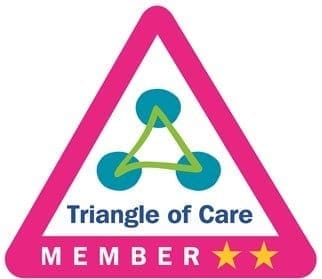
Carer information and support groups
Carer information and support groups provide:
- time to talk, share experiences and support each other
- visiting speakers on health issues and services
- increased understanding of health problems and how they may be managed
- education for carers on looking after their own wellbeing
- information on carers’ rights.
These may be provided by the team, depending on which service your friend or family member has contact with. Ask the care co-ordinator if this is part of what the team offers. You can also access carer education and support programmes run by local carer organisations.
When someone you care for has health problems, it can be worrying and stressful. If you would like someone to talk to, there are a number of people who may be able to help. You can speak to the named nurse or community key worker. The team manager or other members of staff in the team can also help. You can also speak to Gloucestershire Carers Hub or Gloucestershire Young Carers.
As a Trust, we support two carers groups – see more information about the Wotton Lawn Hospital and the Charlton Lane Hospital groups listed below.
There is also a wide range of groups available across the county. To find a carer support group near you, visit the Gloucestershire County Council Your Circle directory (type ‘Carer Support’ in the search bar).
CaSA - Charlton Lane Hospital Group
For carers of those currently within or recently discharged from Charlton Lane Hospital. Held on the first Monday of each month at 3pm in the Conference Room 2, Charlton Lane Hospital. Contact: Helen.Babbage-Peart@ghc.nhs.uk
Wotton Lawn Hospital Carers Group
Are you a carer or family member of an inpatient at Wotton Lawn Hospital?
Would you like to know more about mental illness, how to gain access to practical help or simply looking for some support?
Join our Carers Group which is held monthly at Wotton Lawn Hospital, 6-7pm. This is led by a doctor and advanced nurse practitioner and there will be invited guests.
Topics vary from each session, and are very much based around the needs of the carers present. The group offers a safe, relaxed space where carers and relatives can meet other people in similar situations to them, offload, have a chat and receive support and information.
All information provided will be generalised and not patient specific, as these groups are for all carers of inpatients at Wotton Lawn Hospital. To find out more, contact the team at Wotton Lawn.
If you have a specific concern about your family member’s care, please do not hesitate to contact the team directly.
Organisations offering support
Gloucestershire Talking Therapies
At Gloucestershire Health and Care you can access help through Gloucestershire Talking Therapies, our Improving Access to Psychological Therapies (IAPT) service, which offers a range of support including telephone, face-to-face and group sessions. Your GP can help you access the service or you can visit the Gloucestershire Talking Therapies website to see the support available to you and self refer.
Managing Memory Together
Managing Memory Together provides specialist memory assessment and support services to people with memory problems and dementia.
The Managing Memory Information and Education Service is for:
People worried about their memory
Contact us to:
- Talk in confidence about your concerns
- Get advice on how to cope with forgetting things
- Find out about the signs and symptoms of dementia
- Find out about what happens when someone is referred for a memory assessment
- Know when memory problems are more serious and how to get help.
People with a diagnosis of Mild Cognitive Impairment or Dementia
Family members and carers dealing with either of the above.
Both the above can contact us to access information about:
- Your dementia diagnosis
- Medications and treatments
- Local services for people living with dementia
- Carers support services
- Practical help and support
- Financial and legal issues
- Signposting to other services and agencies
- Living well with dementia
Following a diagnosis of dementia there is an opportunity for both the person with dementia, and the carer, friends or family to attend our group information sessions. These sessions:
- are FREE
- are held at a number of venues across the county throughout the year
- offer a friendly environment to share experiences and learn from peers about dementia and caring
- explore practical ideas to deal with changes and challenges that a diagnosis might bring
- are hosted by the Information and Education Service (IES) and supported and delivered by consultant psychiatrists, psychologists, occupational therapists and speech and language therapists.
If you would like to shadow any of these sessions, just for information, or with a view to supporting delivery, please call 0800 694 8800.
Sessions include:
Living Well with Dementia (LW) – for people with early stage dementia and family members / friends that support them. Two sessions:
- Memory and Dementia
- What’s Important to You
Learning about Dementia Together (LADT) – for family members / friends of people with dementia. Four sessions:
- About Dementia
- Dealing with Change
- Managing Communication
- Next Steps
Opportunities and support
- Online: Carers of People with Dementia Support Group
Fourth Tuesday monthly – 19:00 to 20:30 - Online: Carers of People with Young Onset Dementia Support Group
First Wednesday monthly – 19:00 to 20:30 - Your Voice Matters – Experts by Experience Group
Online quarterly - Quarterly Newsletter – if you would like to receive this, please contact below
- Catch Up and Have Your Say Sessions
- One-off Information Sessions – both online and in person.
For further information please contact:
Telephone: 0800 694 8800
Email: managingmemory@ghc.nhs.uk
Further information about Managing Memory Together can be found here>
Gloucestershire Carers Hub
Jointly commissioned by Gloucestershire County Council and NHS Gloucestershire, Gloucestershire Carers Hub opened in April 2019 and has been supporting unpaid carers ever since.
An unpaid carer is defined as somebody, of any age, who provides support or who looks after a family member, partner or friend who needs help because of frailty, physical or mental illness, or disability. This would not usually include someone paid or employed to carry out that role, or someone who is a volunteer.
Did you know?
- One in 10 people in Gloucestershire are unpaid carers
- Within Gloucestershire, 15 people in a single day will unexpectedly become an unpaid carer
- 5 million people in the UK are juggling caring responsibilities with work – that’s one in seven of the workforce
Gloucestershire Carers Hub provides a raft of free services to carers (over 18 years of age) including:
- Information, advice and guidance
- Training
- Carers’ assessments
- Health and wellbeing support
- Carers Emergency Scheme and contingency planning
In addition, the Hub offers advice regarding carers’ rights in regard to employment, extended opening hours of its telephone support/ triage team, from 8am to 8pm on a Tuesday and Thursday, as well as Twilight Carer drop-in sessions via Zoom to connect with other carers.
To register with Gloucestershire Carers Hub telephone 0300 111 9000, or email Carers@peopleplus.co.uk
Gloucestershire Young Carers
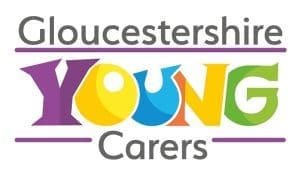
Gloucestershire Young Carers offers:
- information, advice and guidance
- assessment and support planning
- emotional support
- Carers’ Voice
Telephone: 01452 733060 Website: www.glosyoungcarers.org.uk
Anyone can refer
With the agreement of the young person and their family, anyone can refer a young person to Gloucestershire Young Carers. This could be the young person themselves, a member of the family, a family friend or a professional working with the family (eg. GPs, social workers, health workers, teachers, educational staff and community workers).
To find out more about referring to Gloucestershire Young Carers, click here>
Age UK Gloucestershire
Age UK is an independent, local charity working in the community to support older people, their families and carers.
Website: Welcome to Age UK Gloucestershire
Family Information Service
For information on family finances, finding and choosing childcare and local activities, parenting support, education and housing: www.glosfamiliesdirectory.org.uk
Freephone: 0800 542 02 02
Direct line: 01452 427362
Guideposts Trust
Guideposts Trust is a UK charity supporting people with learning difficulties, complex mental health needs and dementia.
Website: Home – Guideposts Trust
Carers Emergency Scheme - Gloucestershire
A service to support carers by providing free replacement care when the carer suddenly or unexpectedly becomes ill, or has an accident which prevents him/her from providing care. To register, contact: Gloucestershire Carers Hub (provided by PeoplePlus) in Gloucestershire. Telephone 0300 111 9000.
Carers UK
Carers UK is there to listen to carers, give expert information and advice tailored to people’s individual situations, champion carers’ rights and support them in finding new ways to manage at home, at work, or wherever they are.
Click here to access the Carers UK website, which contains lots of helpful information, advice and resources for carers.
POhWER
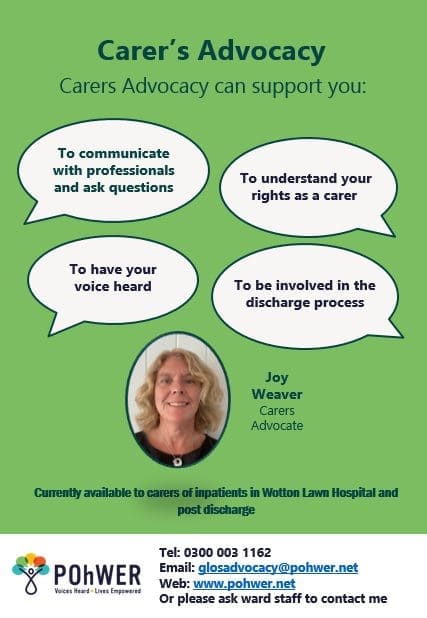
Advocacy
Advocacy services provide support to ensure disadvantaged people are treated fairly and have equal rights.
In Gloucestershire, POhWER provides advocacy services, including:
- Independent Care Act Advocacy
- Independent Mental Capacity Advocacy
- Independent Mental Health Advocacy
- Independent Health Complaints Advocacy
- Independent advocacy to eligible individuals wishing to complain about their experience of adult social care.
POhWER can be contacted using the following details:
Telephone: 0300 456 2370
Email: pohwer@pohwer.net
You can also text the word ‘pohwer’ with your name and number to: 81025
Caring for Communities and People
Caring for Communities and People offers:
- Advocacy: free health and social care and statutory mental health advocacy service
- Appropriate Adult Scheme: for young people and adults with mental health or learning difficulties held in police custody
- Family mediation
- Family support
Telephone: 01452 894594 or 0800 644 6448
Website: www.ccp.org.uk
Schools and colleges
Many schools and colleges in Gloucestershire have a named young carer link worker. Please contact the appropriate school or college directly for details.
Family Lives
Family Lives offers family and parenting support, befriending for parents and mentoring for children. Providing help and support for all aspects of family life.
Telephone: 0808 800 2222
Website: www.familylives.org.uk
Other organisations offering support
Carers organisations also offer a range of emotional support and counselling services to carers – you can find their contact details by clicking here.

